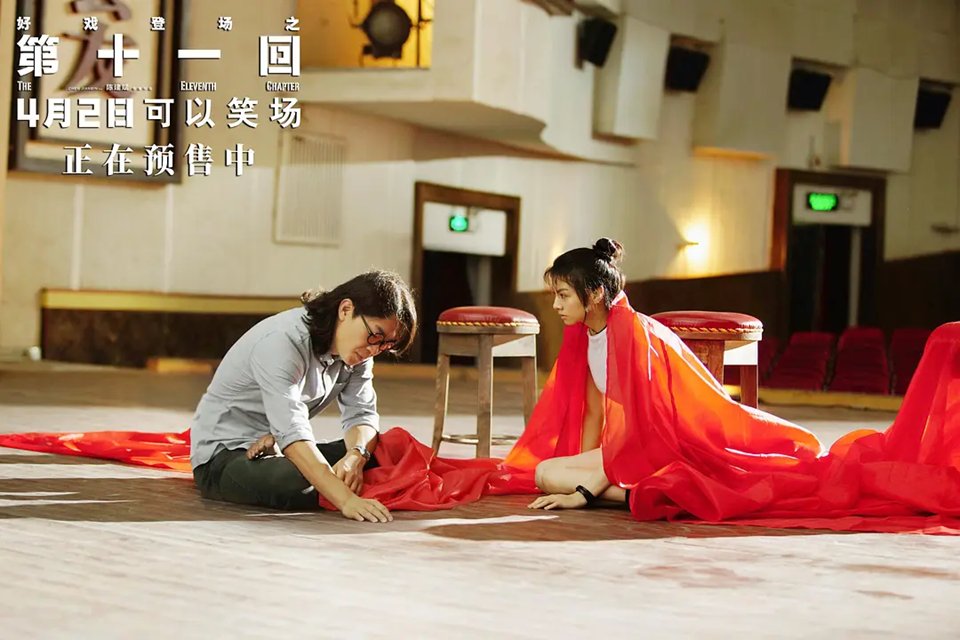Chen Jianbin’s murder-in-a-play-in-a-film, The Eleventh Chapter, is a labyrinthine performance of truth
Blending love with chaos, frustration with resignation, Chen Jianbin's new film The Eleventh Chapter explores the concept of truth—or the lack of absolute truth—in two domains not known for having it in abundance: murder, and theater.
Featuring some of China’s most beloved movie stars—including Zhou Xun after a two-year absence from the silver screen—The Eleventh Chapter tells the story of Ma Fuli (Chen Jianbin), a middle-aged convict who served 15 years in jail for murder, as he learns that a local theater will be putting on a play based on his crime. Thirty years ago, Ma confessed to killing his first wife and her lover by running them over with a tractor, but later maintained it was an accident, and that he'd made up the crime rather than admit he was ignorant of his wife's affair. Fearing that the play’s fame will carve his reputation as a murderer into stone, Ma goes out of his way to persuade the play's director to change the script.
In 11 chapters, the film follows the drama and strife of a colorful cast, weaving together characters, plotlines, and entanglements throughout the story: The theater gatekeeper Gou Yewu (played by Liu Jinshan) is friend with the aunt of the wife of Hu Kunding (Da Peng), the play's director, who is cheating with the young female lead Jia Meiyi (Chun Xia). At the same time, Ma’s teenage stepdaughter Jin Duoduo (Dou Jingtong) learns of an unexpected pregnancy.

(Douban)
The film’s interest in the complex nature of truth holds an extra layer of urgency in today's China, where the court of public opinion and social media often adjudicate crimes outside of the court system, and the public turns to the "human flesh search engine" to exact vigilante justice. Though Ma Fuli talks repeatedly of appealing to the court, there are no court scenes in the movie. Whether or not he murdered his ex-wife and her lover is left to the individuals (both in the film and the audience) to decide as Chen Jianbin explores truth as a private jurisdiction. As the heated tug-of-war between Ma and the theater company leads to script change after script change, the audience find themselves overwhelmed with interpretations while attempting, and perhaps failing, to decide for themselves the truth about Ma Fuli’s crime.
The film is the second directorial effort of Chen Jianbin, its lead actor, who was formerly known for playing emperors in historical period dramas. Following up his self-written and self-acted film A Fool, about a man with intellectual disabilities in a small town, The Eleventh Chapter won Best Screenplay at the 2019 Beijing International Film Festival, and cemented Chen’s reputation as an auteur of gritty contemporary drama-comedies.
One of the stylistic pleasures of The Eleventh Chapter is that it artfully blends creative mediums, drawing from both literature and live theater. The chapter titles, written in couplets, are reminiscent in language and visual style of traditional Chinese novels, such as Dreams of the Red Chamber and Water Margin, and their film adaptations: short, concise narrative cliffhangers. The audience finds themselves immersed in the making of the play, watching on as the actors rehearse on stage with a big piece of red cloth, listening to Hu recite useless theories about performance, and following Ma as he eavesdrops on the rehearsals behind the heavy and layered stage curtains.

(Douban)
Character names are often highly and perhaps ironically instructive: Ma Fuli's name, which literally translates as “horse, luck, propriety,” encompasses just the opposite of his actual lot in life. Gou Yewu’s name suggests “even a dog can be a warrior.” The name of Ma’s wife Jin Cailing (played against type by Zhou Xun) translates to “the golden bell tolling for money,” and she characterizes vividly the vulgarity, arrogance, and violence of the hanfu (悍妇), the stereotype of a bad-tempered wife. While it is inspiring to see women from lower socio-economic classes on screen, and witness the depiction of female rage, such characters are stiffly oversimplified and two-dimensional in the film.
Likewise, Ma’s rebuilt and struggling family are moving: the sacrifices they make for one another, the loving banter over trivialities, and the way this patchwork family comes together to care for and support each other. Yet two major subplots about women—the stepdaughter’s pregnancy, and Hu and Jia’s extramarital affair—are underexplored. Both narratives are instead folded into the wider theme of truth and carry on the spirit of play-within-a-play: To protect her daughter’s reputation, Jin Cailing sews a pillow under her clothes and pretends she’s the one who’s pregnant, but later finds herself unwilling to remove it, confusing reality with theater. The wordplay in the names of Jia Meiyi, director Hu’s mistress, and Zhen Manyu (Song Jia), Hu’s wife, endeavors to distinguish between truth (真, zhēn) and falsehood (假, jiǎ), evocative of the couplet in Dreams of the Red Chamber’s early chapters:
Truth becomes fiction when the fiction’s true;
Real becomes not-real where the unreal’s real.
-Translated by David Hawkes
Yet despite their thematic relevance, both Jin Duoduo and Jia Meiyi's subplots over-glorify romantic love and are bereaved of autonomy over their affections and bodies. Similarly, the film’s early obsession with whether or not the tofu soup (which Ma and Jin make and sell for a living) is too sweet or salty, illustrates that truth differs from one person to another, but is poorly handled—the performance is overly dramatic and the symbolism is too heavy-handed.
The film concludes without a verdict on whether or not Ma had committed murder. Toward the end, the young actress Jia Meiyi offers an additional interpretation to the messy state of conflicting narratives, but the film leaves the audience without an answer even up until the post-credits scene. Director Chen rejects the idea that truth matters at all—rather, it is the public consumption of truth that is significant, as in a play or a film—and that sets the trajectory of one's life.
Cover image from Douban












